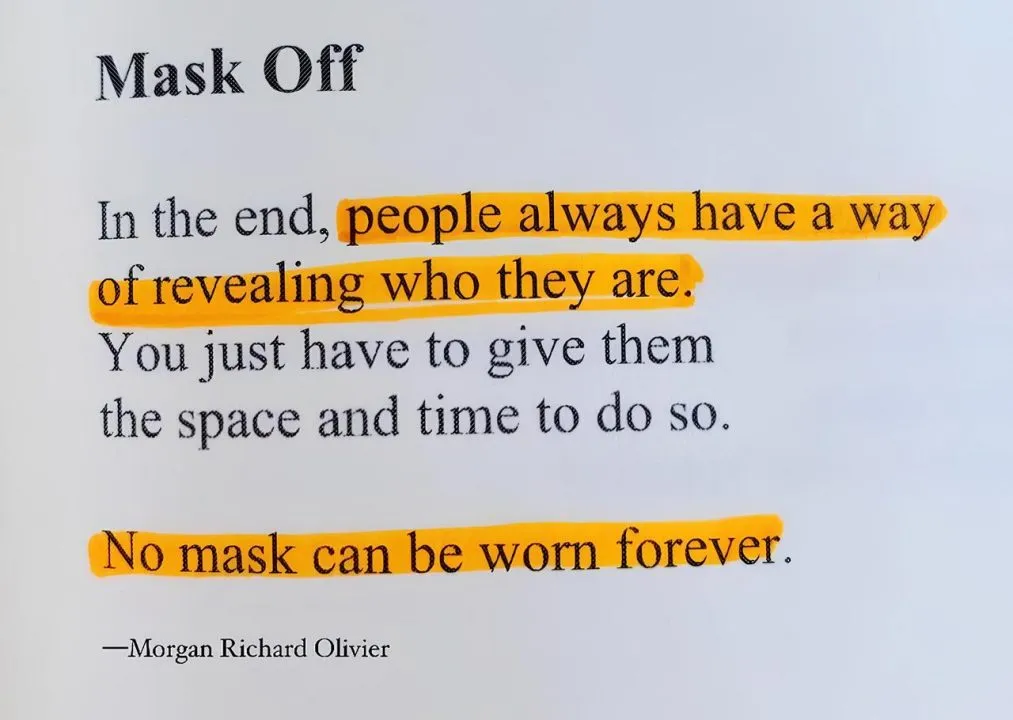Today's Saturday • 9 mins read
Narcissists make you so dependent on them that you cannot imagine leaving them. That’s when they finally let down their masks.
A narcissist’s mask makes them what they want the world to see them as.
This mask is the key to their relationships, charm, and success. It lets them lie, cheat, and gaslight, and yet give the impression that they are the best person in your life.
Unmasking them will do you and the world a favor. You can save your resources, emotions, and time.
Is there a way to unmask and expose your narcissist?
How To Expose A Narcissist And Unmask Them
First, know the person you’re going to expose:
A superficially charming, self-serving, unempathetic liar, who will not admit responsibility for their mistakes.

Four practical ways to expose them:
1. Identify the typical narcissistic behaviors
You feel that something is not right with this person, but you can’t figure out what. Narcissists have typical behaviors — identify them:
This person in your life always seems to be the star of every story. They glorify their achievements and skills, making themselves seem more important or talented than they really are. This grandiose self-image is a classic sign of narcissism.
They want special attention given to them. They can’t bear it when someone else gets precedence over them.
You may notice how they react with anger or get defensive when they don’t get their way or are faced with criticism, no matter how mild.
Another red flag is they can’t easily say “Sorry” or accept responsibility for things they did wrong. But they will try to get credit for every good thing that happened with their slightest contribution.
Also, they are tightly closed to suggestions of improvement.
Pay attention to how they treat others. Narcissists are charming to those they want to impress or are afraid of. But dismissive or even cruel to those they perceive as “beneath” them. You’ll see them act rude with waitstaff, subordinate, and family members.
This person constantly tries to deny your version of events and make you question your reality. This is typical narcissistic gaslighting, used to get control over your mental state.
To sum up, their typical traits are these:
- Grandiose sense of self-importance and entitlement.
- Expectation of constant praise and validation from others.
- Accept favors from others without being grateful or reciprocating.
- Preoccupation with fantasies of spectacular success, power, or beauty.
- ‘Use-and-throw’ others to get what they want, without guilt or remorse.
[Read: 20 Signs of A Narcissist: Biggest Red Flags of Narcissism]
2. Embarrass them to trigger narcissistic rage
You can embarrass a narcissist by pointing out the lies they told you, by providing evidence of when they slipped up.
You see, a narcissist has a lot of lies behind them. So they have to stay alert about what lies they have already told you and be careful about what versions of the same lie they might blurt out to others.
Moreover, they change their stories so much that they can’t keep up with their own lies.
When you call them out with a lie that they told you, they may initially stonewall you or silently express how much hurt you are causing them.
They can also try to explain their behavior with some outrageous explanation, such as they were under threat from the FBI.
When you repeat your unmasking effort a few more times at other times, they cannot stop themselves from showing that narcissistic rage.
In that rage, they might blame you for not understanding why they did it, instead of having a rational discussion about the issue.
This can get extremely dangerous at this point. Stay close to the exit if you want to unmask them by triggering narcissistic rage.
[The most dangerous type of narcissist is the malignant narcissist.]
3. Wait for time to pass — they will unmask themselves
Over time, narcissists grow so tired of wearing their mask that they throw it off.
They are unbothered that you will see under the ruse — an egoist, callous, entitled, hollow and fake person who falsely claimed respect for all those years.
But they take off their masks for only those who are either codependent on them (“under their spell”) or those they have discarded. So, it may take a long time.
Truth always seeps through time and brings everything to the surface.

With time, they start to feel they have total control over you, so they can stop pretending to be a good person. Initially, they may let the mask deliberately slip a few times to check your reactions.
Once they feel emboldened, they go to their original vile self, without bothering about whether you are shocked or not.
They are not as smart as they feel they are. The bulk of what they say or do is a lie, an untruth, or some other type of misrepresentation. Nothing they say ever actually adds up. They repeatedly contradict themselves. This always came back to bite them.
Karma is a dish best served cold. Let Time serve them that dish. Hopefully, you are away from them by the time they are exposed by Time.
4. Lay a well-planned trap to catch their lies
How to expose a lying narcissist?
Some strategies to consider:
- Gather undeniable evidence: Collect concrete evidence of the narcissist’s lies, such as emails, text messages, or witness accounts. This can help you defend yourself if they try to gaslight or manipulate you.
- Create a public confrontation: Get them into a situation where other people who know you are present, and confront the narcissist with the facts you learned. Make the situation so foolproof that they have no way out other than to accept it.
- Prioritize your safety: Being among others helps keep you safe for the time of unmasking.
- Decide on consequences: Decide beforehand what consequences you are ready to accept — an apology with assurances of no repeat offense, or a clean break.
Proceed with caution when trying to expose a narcissist’s lies. Confrontation can escalate the situation and lead to further manipulation or abuse.
I’d suggest you protect yourself and your well-being rather than expose a narcissist. If you do decide to confront them, have people to support you in case of a severe reaction.
What Lies Beneath a Narcissist’s Mask
- Self-centeredness: Narcissists prioritize their own needs and desires above all else.
- Lack of empathy: They struggle to understand or care about the feelings of others.
- Constant admiration: They seek constant praise and attention to validate their inflated sense of self.
- Low self-esteem: Beneath their outward confidence lies a fragile sense of self-worth.
- Fear of exposure and abandonment: Narcissists are deeply afraid of being exposed as frauds or abandoned by others.
- Bitterness and revengefulness: They often harbor resentment and a desire to get back at those they perceive as threats.
- Manipulation: Narcissists are skilled at manipulating others to get what they want.
- Pathological lying: They frequently lie to maintain their idealized self-image and avoid negative consequences.
- Gaslighting: They may use gaslighting tactics to undermine the reality of others and make them question their own perceptions.
- Initial charm: Narcissists can be charming and charismatic in the early stages of relationships.
- Controlling behavior: Over time, their controlling and demanding nature becomes apparent.
- Ungrateful and selfish: They take advantage of others without expressing gratitude or considering their needs.
- Insatiable need for admiration and attention: Narcissists constantly crave praise and validation.
What Happens When You Unmask a Narcissist
- Denial: When confronted with their true nature, narcissists often deny their behavior.
- Rage: They may become enraged when their manipulative tactics are exposed.
- Vulnerability: Unmasking a narcissist can make them feel vulnerable and exposed to the world.
- Fear of exposure: They may fear that others will learn their true nature and no longer believe their lies.
- Discarding the victim: Narcissists often discard people who challenge their idealized self-image or threaten their control.
How to Deal With A Narcissist After Unmasking Them
- Stick to your truth: Be firm and assertive, and don’t let yourself be swayed by their explanations or manipulations.
- Reduce their rage: Agree with their point of view to de-escalate the situation and avoid further dispute.
- Set boundaries: Clearly communicate your limits and expectations, and be prepared to remove yourself from the situation if necessary.
- Discard them: Tell the narcissist that you no longer need them in your life.
- Focus on your own happiness: Prioritize your well-being and strive to live a fulfilling life.
- Avoid regret: Don’t feel guilty or sorry for leaving a narcissist.
Potential Risks of Unmasking a Narcissist
Consider the potential risks before deciding to unmask a narcissist:
- Denial and blame: Narcissists are unlikely to admit their flaws, and will likely try to blame others for their problems.
- Insults and harm: They may resort to insults, manipulation, or other harmful behaviors to retaliate against those who challenge their idealized self-image.
- Discarding the victim: Narcissists often discard people who threaten their control or expose their true nature.
- Risk of backfire: Unmasking a narcissist can be risky, as they may have a loyal following who will defend them and discredit you.
- Emotional turmoil: Confronting a narcissist can be emotionally taxing and may lead to feelings of anxiety, stress, or depression.
- Legal consequences: In some cases, unmasking a narcissist can lead to legal repercussions, especially if they feel threatened or defamed.
- Social isolation: Narcissists may try to isolate their victims from friends and family, making it difficult to seek support or validation.
- Ongoing harassment: Even after leaving a relationship with a narcissist, victims may experience ongoing harassment or stalking.
Don’t try to unmask a narcissist unless you are safe and secure. If you feel weak or vulnerable to your narcissist, prioritize protecting yourself and seeking support from others.
Final Words
Exposing a narcissist may uncage a dark and disturbing person lurking inside. Is that someone to hold on to, lavish your love on, or sacrifice your energies and resources on?
Will a narcissist come back if you unmask them? Probably not. But some darker narcopaths can try to hoover you back to wreak revenge on you, and this time, they will be more careful and crueler.
Even if they do not try to get revenge, despite all their apologies and promises about changing themselves, they are not going to get any better.
Everything said, I must caution you that noticing those behaviors doesn’t automatically mean you’re living with a narcissist. But yes, it’s a starting point for understanding your situation better.
Also read: How to correctly argue with a narcissist
√ If you liked it, please spread the word.
» You deserve happiness! Choosing therapy could be your best decision.
...
• Disclosure: Buying via our links earns us a small commission.